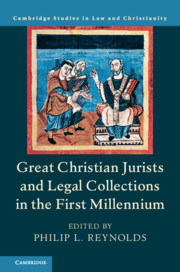Book contents
- Great Christian Jurists and Legal Collections in the First Millennium
- Law and Christianity
- Great Christian Jurists and Legal Collections in the First Millennium
- Copyright page
- Contents
- Contributors
- Preface and Acknowledgments
- Abbreviations
- Part I
- 1 Normative Texts and Practices of the First Millennium
- 2 The Many Voices of Roman Law
- 3 The Law of the Post-Roman Kingdoms
- 4 Ecclesiastical Councils
- 5 The Papacy
- 6 The Sacred Palace, Public Penance, and the Carolingian Polity1
- 7 Canonical Collections
- 8 The Practice and Literature of Penance
- 9 Monastic Rules
- Part II
- Index
- References
2 - The Many Voices of Roman Law
from Part I
Published online by Cambridge University Press: 21 June 2019
- Great Christian Jurists and Legal Collections in the First Millennium
- Law and Christianity
- Great Christian Jurists and Legal Collections in the First Millennium
- Copyright page
- Contents
- Contributors
- Preface and Acknowledgments
- Abbreviations
- Part I
- 1 Normative Texts and Practices of the First Millennium
- 2 The Many Voices of Roman Law
- 3 The Law of the Post-Roman Kingdoms
- 4 Ecclesiastical Councils
- 5 The Papacy
- 6 The Sacred Palace, Public Penance, and the Carolingian Polity1
- 7 Canonical Collections
- 8 The Practice and Literature of Penance
- 9 Monastic Rules
- Part II
- Index
- References
Summary
The Roman Empire benefited from legal pluralism. Civil law (ius civile) provided access to legal right (ius). Under the Roman Republic, it was expressed through statutes, resolutions of the Senate, edicts of magistrates, and interpretations by experts. Unwritten custom and equity were also recognized as determinants of legal decisions. From the first century CE, emperors, often responding to external prompts, legislated through edicts, legal letters, and rescripts. Law was also shaped and manipulated “on the ground” by advocates, petitioners, and judges. Many disputes were resolved informally by arbitration, negotiation, mediation, and powerful men. Bishops had been informal conciliators from the beginning, but from Constantine onward their judicial power was recognized officially in the context of the episcopal hearing (episcopalis audientia). In Late Antiquity, Diocletian, Theodosius II, and Justinian commissioned “codifications” of imperial law. Justinian was the first to set Roman law in a Christian framework. While preserving the law’s past content, he aimed to suppress diversity in it henceforth.
Keywords
- Type
- Chapter
- Information
- Publisher: Cambridge University PressPrint publication year: 2019

